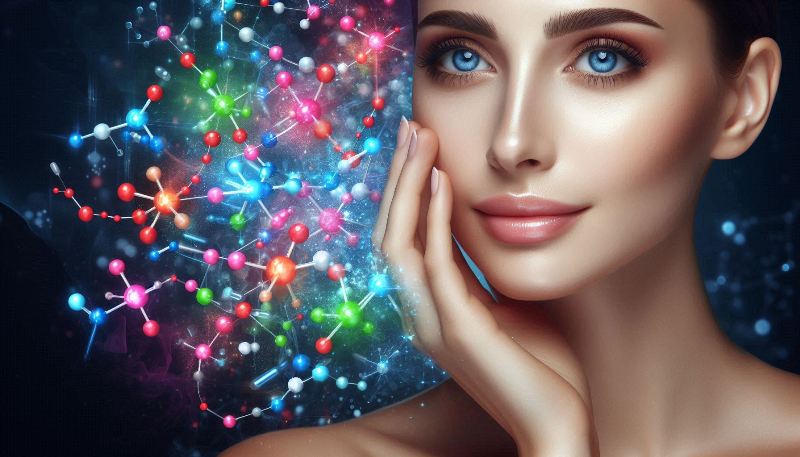In the quest for youthful, radiant skin, peptides have emerged as one of the most powerful ingredients in the skincare world. Peptides, small chains of amino acids, play a vital role in the production of collagen and elastin—proteins essential for maintaining skin’s firmness, elasticity, and overall health. As we age, natural collagen production slows down, leading to wrinkles, sagging, and dullness. The best peptides for anti-aging and skincare can help reverse these signs of aging, giving you smoother, firmer, and more youthful-looking skin.
What are Peptides and How Do They Work in Skincare?
Peptides are short chains of amino acids that act as building blocks for proteins like collagen and elastin. When applied to the skin, they signal your body to produce more collagen, effectively promoting skin repair and reducing visible signs of aging such as wrinkles and fine lines. Peptides also help in fortifying the skin barrier, improving moisture retention, and protecting the skin from environmental damage.
Types of Peptides Used in Anti-Aging Skincare
1. Copper Peptides
Copper peptides are known for their ability to heal wounds, boost collagen production, and reduce inflammation. They are often referred to as the “anti-aging hero” in the skincare industry due to their regenerative properties. Copper peptides help to firm the skin and reduce the appearance of wrinkles, making them one of the best peptides for anti-aging.
2. Palmitoyl Pentapeptide-4
This peptide stimulates collagen production and helps improve the skin’s texture. Studies have shown that Palmitoyl Pentapeptide-4 can effectively reduce fine lines and wrinkles, making it a popular ingredient in anti-aging creams.
3. Matrixyl 3000
Matrixyl 3000 is a well-known peptide complex that improves skin elasticity and firmness. It also supports the synthesis of collagen and fibronectin, proteins that give the skin structure and resilience. Matrixyl 3000 is highly effective in reducing both dynamic and static wrinkles, making it ideal for long-term anti-aging results.
4. Argireline (Acetyl Hexapeptide-8)
Argireline is often called “Botox in a bottle” because it reduces the movement of facial muscles, minimizing the formation of wrinkles caused by repetitive expressions. This makes Argireline especially effective for targeting crow’s feet and forehead lines.
5. Tripeptide-1
This peptide is known for its role in cellular renewal and tissue repair. It helps in rejuvenating the skin by boosting collagen production and strengthening the skin’s structure.
How Do Peptides Benefit the Skin?
Peptides offer multiple benefits when incorporated into your skincare routine. These benefits include:
- Boosting collagen production: Peptides signal the body to create more collagen, leading to firmer and more youthful skin.
- Reducing wrinkles: Regular use of peptide-infused products can smooth out fine lines and wrinkles over time.
- Improving skin elasticity: Peptides strengthen the skin’s barrier and improve its elasticity, helping it to appear more toned.
- Enhancing moisture retention: Peptides help the skin hold onto moisture, resulting in a plump, hydrated complexion.
- Reducing inflammation: Some peptides, like copper peptides, have anti-inflammatory properties that can help calm irritated skin.
How to Use Peptides in Your Skincare Routine
Incorporating peptides into your skincare routine is easy. Here’s how you can do it effectively:
- Cleansing: Always start with a clean face to allow the peptides to penetrate the skin effectively.
- Peptide Serum: Apply a peptide-infused serum after cleansing and toning. Serums have a higher concentration of active ingredients, making them more effective for targeting specific skin concerns.
- Moisturizer: Lock in the peptide benefits by applying a moisturizer that also contains peptides to maintain hydration and protect the skin barrier.
- Consistency: Peptides work over time, so consistency is key. Use peptide products daily for the best results.
Frequently Asked Questions (FAQs)
1. What peptides are best for anti-aging?
The best peptides for anti-aging include Copper Peptides, Matrixyl 3000, Argireline, Palmitoyl Pentapeptide-4, and Tripeptide-1. These peptides work by stimulating collagen production, improving skin elasticity, and reducing wrinkles.
2. Can peptides reverse aging?
While peptides cannot completely reverse aging, they can significantly reduce the visible signs of aging by boosting collagen production, firming the skin, and minimizing fine lines and wrinkles.
3. Are peptides safe for all skin types?
Yes, peptides are generally safe for all skin types, including sensitive skin. However, it is recommended to do a patch test before incorporating any new product into your skincare routine.
4. How long does it take to see results from peptides?
Visible improvements in skin texture and firmness can be noticed after about 4-6 weeks of consistent use, though results may vary depending on the individual and the type of peptide used.
Conclusion: Peptides as a Game-Changer for Skincare
Peptides have become a key ingredient in modern anti-aging skincare due to their ability to boost collagen production, improve skin texture, and reduce the appearance of wrinkles. By incorporating the best peptides for anti-aging and skincare into your daily routine, you can enjoy youthful, radiant skin that defies the effects of time. Whether you’re using Copper Peptides for their healing properties or Matrixyl 3000 for reducing wrinkles, these powerful ingredients are essential in maintaining healthy, glowing skin.

